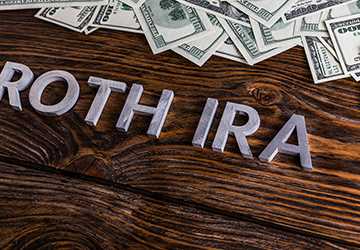Embarking on the journey towards fiscal fortitude through Roth IRA investments unveils a path laden with distinct fiscal privileges for the astute investor. This discourse endeavours to illuminate the ideal demographic to reap the bountiful harvest that a Roth IRA promises, emphasizing the benefits of the Roth IRA, elucidating the criteria for qualifying for a Roth IRA, and addressing the pivotal question: Should I open a Roth IRA?

Unveiling the Virtues of Roth IRA
The Roth IRA is revered for its fiscal sagacity, diverging from traditional retirement conduits that offer initial tax reprieve yet impose taxation upon eventual distribution. Roth IRAs champion a paradigm where investments burgeon in a sanctum free from taxation, with distributions in the autumnal years of life similarly unencumbered by taxes. This facet is particularly enticing for those who envisage their future in a more wealthy tax bracket.
● Immunity from Taxation on Accruals and Disbursements: The quintessence of the Roth IRA lies in its promise of investments and the ensuing profits, enjoying a sanctuary free from the reach of taxation upon retirement withdrawal.
● Dispensation from Compulsory Disbursements: What sets Roth IRAs apart from their retirement savings counterparts is the absence of a decree mandating distributions after a certain zenith of age, allowing for a prolonged period of financial maturation.
● Malleability: A Roth IRA offers unparalleled flexibility, allowing early withdrawals under certain conditions, such as purchasing a primary residence. This flexibility is rarely found in alternative retirement accounts.
The Eligibility Codex for Roth IRA
Entry into the Roth IRA realm is not a universal entitlement; fiscal demarcations circumscribe it. For instance, as the calendar marked 2023, individuals and matrimonially united duos filing jointly encountered the onset of contribution diminution at MAGI echelons, surpassing $144,000 and $214,000, respectively.
● Financial Demarcations: Vigilance towards MAGI ceilings is imperative to discern one's qualification for Roth IRA contributions.
● Taxation Filiation: The nature of one's tax filing status bears significance, moulding one's eligibility and the pinnacle of permissible contributions.
Should I Open a Roth IRA?
The contemplation over inaugurating a Roth IRA is contingent upon thoroughly examining one's present financial landscape, projected fiscal stratum in forthcoming eras, and aspirations of retirement bliss.
● Ascendant Vocations: A Roth IRA presents a lucrative prospect for individuals at the genesis of their vocational journey, presently nestled in a modest tax bracket but with prospects of ascension.
● Affluent Entities Within Eligible Financial Strata: This is for those whose monetary resources nestle within the eligible brackets, with prognostications of heightened tax obligations upon retirement.
● Proponents of Fiscal Liberality: Individuals who value the privilege of releasing their contributions (rather than their income) before retirement will not be penalized.
Stratagems for Amplifying Roth IRA Advantages
To extract the quintessence from a Roth IRA, ponder upon the ensuing stratagems:
● Precocious Commencement: An early foray into investment lays the groundwork for an extended period of tax-exempt asset augmentation.
● Assiduous Contributions: Adherence to maximal contribution at regular intervals optimizes the tax-exempt potential.
● Roth Conversion Deliberation: For those with traditional IRA holdings, a strategic conversion to a Roth IRA may prove optimistic, particularly with anticipations of a more burdensome tax bracket in the retirement horizon.
Masterful Approaches for Roth IRA Aspirants: Unveiling the Roth IRA Usefulness
At the precipice of venturing into Roth IRA investments, many sophisticated tactics and considerations emerge designed to augment the Roth IRA benefits and resonate with overarching economic ambitions. This elucidation explores the depths of astute decision-making pertinent to Roth IRA investments, especially for those pondering whether I should open a Roth IRA.

Navigating Economic Shifts through a Roth IRA Lens
● Forecasting Ascension in Tax Brackets Due to Vocational Advancement: Investors envisaging an upward trajectory through tax brackets due to professional growth will find the Roth IRA a formidable defence against future fiscal impositions, safeguarding their nest egg from escalating taxation; this is a prime Roth IRA benefit for those who qualify for a Roth IRA.
● Capitalizing on Fiscal Ebbs and Tides: During economic downturns, savvy investors seize the opportunity to bolster their Roth IRA contributions, especially when earnings experience a fleeting decline. This strategic move primes them for tax-exempt accretion once the market rebounds, illustrating the critical considerations under Should I open a Roth IRA?
Decoding the Roth IRA Conversion Enigma
● Optimal Timing and Fiscal Considerations: Identifying the most auspicious moment for transitioning funds from traditional IRAs to a Roth IRA necessitates an intricate analysis of prevailing tax responsibilities versus anticipated future economies, ensuring the action does not engender unwarranted fiscal strains—a core component for individuals asking if they should open a Roth IRA.
● Prospective Planning for the Long Haul: The stratagem of Roth conversions is predominantly beneficial for those casting their financial planning nets far into the future, allowing ample duration for the allure of tax-exempt proliferation to surpass the upfront tax implications inherent in the conversion process.
Enhancing Outcomes While Mitigating Risks
● Allocation Wisdom for Risk Dispersion: Spreading investments within a Roth IRA across a diverse array of assets, from equities to bonds and beyond, cushions against the jolts of market volatility. This tailored mix aligns with individual risk appetites and investment timelines.
● Consistent Portfolio Re-evaluation and Refinement: It is critical to periodically reassess and recalibrate the investment amalgam within a Roth IRA. This ensures the portfolio remains in harmony with evolving life goals, market dynamics, and personal circumstances, thereby amplifying the growth prospects of Roth IRA contributions.
Conclusion
A Roth IRA offers unique fiscal advantages for those within its eligibility sphere, including tax-exempt growth, the absence of mandated minimum distributions, and a superior degree of withdrawal flexibility. Such an investment could significantly enhance your retirement strategy, whether you are at the dawn of your professional endeavours or within the financial precincts allowing for Roth IRA participation. As with all financial deliberations, a bespoke evaluation of your situation, complemented by sage advice from a financial luminary, is recommended to navigate towards a prosperous economic future.




